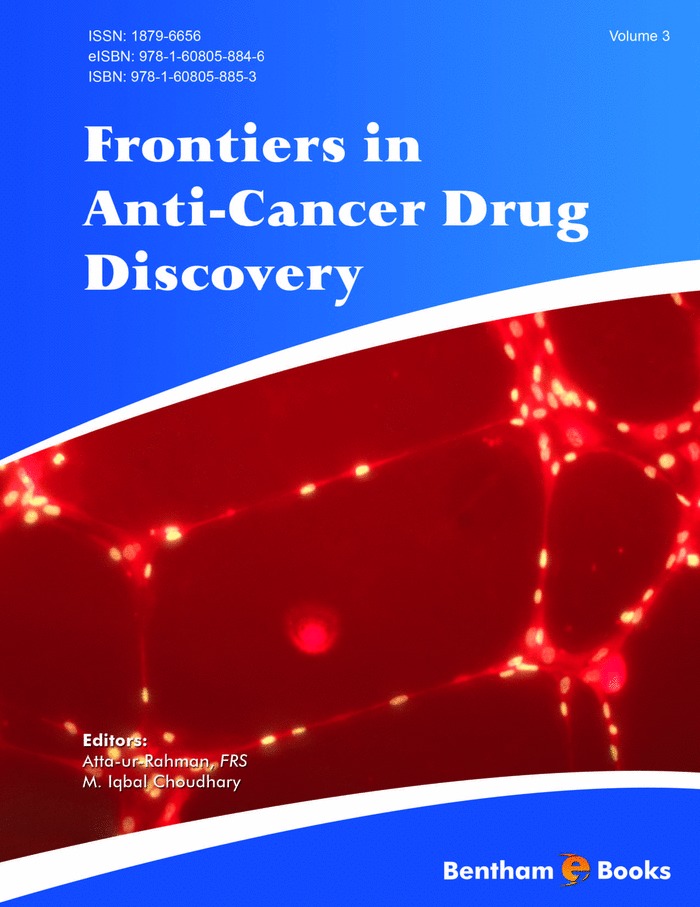Cancer is the leading cause of death and an enduring threat to human well being. No other disease has received so much of scientific and societal attention as cancers over the last several decades. However, effective treatment to various forms of cancer is still much sought for. It is therefore imperative to gain knowledge and develop a deeper understanding about the causes of cancer, and the appropriate interventions to prevent and manage the disease. It is necessary to develop scientific strategies for cancer prevention and control, and to disseminate existing knowledge to assist the development of evidence-based approaches towards cancer diagnosis and treatment.
Volume 3 of the eBook series “Frontiers in Anti-Cancer Drug Discovery” is a compilation of eight excellent reviews on various, approaches, concerns and issues related to cancer prevention, diagnosis, and treatment.
Understanding carcinogenesis at the molecular level is possible by employing modern molecular biological techniques. The review contributed by Raza et al. describes the role of topoisomerase inhibitors in cancer treatment. DNA Topoisomerases are important targets in the development of cancer therapeutics. Inhibitors of topoisomerases cause DNA strand breakages that can ultimately lead to cancer cell death. The authors have also reviewed various classes of inhibitors including catalytic and dual inhibitors with fewer side effects.
Chapter 2, contributed by Vladan P. Čokić and Juan F. Santibáñez, discusses new approaches to the understanding of molecular pathomechanism of myeloprolife- rative neoplasms (MPNs), new innovative JAK (Janus kinase 2) inhibiting drugs and potential therapeutic strategies for the treatment of BCR/ABL-negative myeloproliferative neoplasms. This review highlights the role of TGF-β, JAK2 and others factors that is a challenge to exploit the combinatory therapeutic targets for future treatment of MPNs.
Drug resistance in cancerous cells is a key challenge in the treatment of cancer. Chapter 3 by Pesic et al. highlights the importance of ABCB1 therapy as an important step in cancer treatment. The ABCB1 is over-expressed in multi-drug resistance cells mainly due to its remarkable spectrum of substrates. This review also presents an overview of new anti-cancer therapeutic strategies and discusses their benefits and limitations.
Chapter 4 by de Souza et al. describes the cancer cell metabolism in great detail. This review also compares the functions and regulation of cancer cells with those of non-cancerous cells. They also discuss the challenges and prospects of targeting cancer cell metabolism for cancer treatment.
The resistance of tumors to cytotoxic treatments has been a major barrier in the chemotherapeutic management of cancer. In view of the involvement of nitric oxide in anticancer mechanism, Kenote et al. in chapter 5 discuss its role as a potential adjuvant therapeutic in cancer therapy.
There are many genetic and molecular factors underlying carcinogenesis and that can potentially serve as targets for therapeutic interventions. In chapter 6, Kumar and Shah focus on the key molecular mechanisms for various types of human cancers such as lung cancer, genitourinary cancer, breast cancer, gynecological cancer, gastrointestinal tumors, etc.
Nanotechnology is the science which can be employed for manipulating substances at the cellular and molecular levels. This technology is being applied to stimulate the research in cancer biology that could lead to early diagnosis and enhanced clinical management. Considering the importance of nanotechnology in cancer Yadav et al. in chapter 7 summarize the appropriate drug delivery systems that deliver the chemotherapeutic agents to cancerous tissues without harming non-cancerous tissues.
Last but not the least, Akhter et al. in chapter 8 describes the role of theranostic metallic nanomedicines as chemotherapeutic agents for cancer treatment.
This delightful feast of well written scientific articles on a topics of general relevance makes this eBook a “must to read” for practitioners, scientists, and students. We must thank the contributing scholars for making this volume an important treatise of scientific knowledge. We are also profoundly grateful to the editorial staff, particularly Mr. Mahmood Alam (Director Publication) and Ms. Fariya Zulfiqar (Assistant Manager) for their hard work and persistent efforts.
Prof. Atta-ur-Rahman,
FRS Honorary Life Fellow Kings College
University of Cambridge
UK
Prof. M. Iqbal Choudhary
H.E.J. Research Institute of Chemistry
International Center for Chemical and Biological Sciences
University of Karachi
Pakistan

